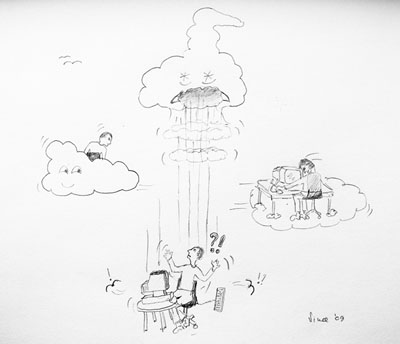Make no mistake about it, Google is the new Microsoft. If Bill Gates once managed the incredible feat of putting Windows into just about every computer on Earth (and got filthy rich doing so), Google is about to achieve the same thing but from a cloud perspective. Will they get rich too? I think they already are. Is it worth it for us? I don’t know, and I don’t think it matters. It has already begun, we’re getting hooked and I know I could no  longer live without my ability to Google stuff at will, for instance.
longer live without my ability to Google stuff at will, for instance.
Cloud computing no longer is a science-fiction concept. While its definition remains up in the clouds, pardon the pun, its reality is undeniable and has been creeping up into our lives steadily for years. So how do we define it? The Wikipedia says that cloud computing is “a style of computing in which dynamically scalable and often virtualised resources are provided as a service over the Internet.” Ok, but what does this mean in plain English, please?
Well, the resources we need, rather than being located on our own computer and utilized locally, are now hosted on a network – in most cases the web. Information search, communications, data storage and processing are all migrating from single-user platforms and local networks to larger, web-wide ones, with the help of mighty new advances like AJAX.
Still confused? Look at it this way: Do you communicate via Skype, AIM or other chat or VoIP networks? You’re kinda in the cloud. Do you use Gmail, Hotmail or any other webmail service? You’re in the cloud. Do you post or share images on Flickr and Picasa, videos on YouTube or files on Mediafire? You’re part of the cloud. Do you routinely waste your time on social networking sites like Facebook and MySpace? You’re being eaten away by the cloud. Did you switch tabs and frantically Googled “cloud computing” to refresh your memory when you read the title of this post? You were surfing the cloud.
But that’s only a beginning. Everything Google offers in terms of services is cloud computing-based, and in my case, that’s quite a few things: Gmail, Docs, Calendar, Picasa, Analytics, Webmaster Tools and more, including the very promising upcoming Google Voice. As a matter of fact, I believe that Google is smartly building the next volatile Windows from the ground up. They will soon have a complete web-based operating system and will be able to completely replace Windows – or any OS. They will only require you to have a very basic shell on the access machine – be it a computer, laptop, Blackberry, iPhone or any device soon to be invented, and that will be that.
There is already quite a lot of competition in the cloud computing business. Web-based services and applications are popping up everywhere, and while not nearly polished yet, they are getting very appealing, very fast. Let me give you a few examples. Need to retouch your photos on the fly and have no access to your home copy of Photoshop? Think no further than Splashup. With a rich user interface and most of the day-to-day features of a serious desktop-based photo and graphics editor, Splash does everything online via your web browser. If your needs are simpler, try Picnik and its very user-friendly retouching options.
And these are just individual applications. What if you want a full suite of web-based applications to duplicate the convenience of your desktop computer while on the road? Time to investigate EyeOS, MyGoya, AjaxWindows, Cloudo, Airset, Ghost and their siblings. They are clones of full-feature desktops, complete with control panels, display themes, many office applications, file storage, emailing and browsing capabilities, FTP access and more. Of course, many of these newly born projects are still looking for their true identity and some haven’t even made it out of beta yet. And to become really inescapable global solutions, they will have to either accept to link or interface directly with existing near-perfect web applications like Google’s or develop their own – in which case, they still have a lot of work to do.
So where are we headed with all this? Towards a helluva complex security and privacy minefield, as people slowly realize that they must now accept to have all their data stored, retrieved and exchanged over the ether. But as early writers were reluctant to store hundreds of precious pages on a magnetic disk that wasn’t even coffee spill-proof, people today will probably resist change and bring out large umbrellas to protect themselves from the cloud – until they eventually realize that for one thing, they can’t avoid or go against the flow and for another, it’ll all be incredibly easier, faster, and more powerful than ever.
Cloud computing isn’t about to rain on us. But it might need some new forecast models and it will definitely trigger the seat belt sign on. The web, after all, usually yields a bumpy ride.
Comments
Marie
Vince